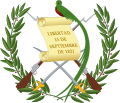| This article is part of a series on |
| Politics of Guatemala |
|---|
 |
Parliamentary elections were held in Guatemala in December 1923. The result was a victory for the Liberal Party, which won all 69 seats. Liberal candidates won overwhelming victories in every constituency, a result that the American diplomatic corps described as farcical. [1]